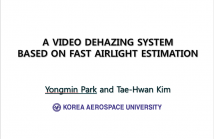
The fifth IEEE Global Conference on Signal and Information Processing (GlobalSIP) will be held in Montreal, Quebec, Canada on November 14-16, 2017. GlobalSIP is a flagship IEEE Signal Processing Society conference. It focuses on signal and information processing with an emphasis on up-and-coming signal processing themes. The conference features world-class plenary speeches, distinguished Symposium talks, tutorials, exhibits, oral and poster sessions, and panels. Visit website.
- Read more about DICTIONARY LEARNING IN THE ANALYSIS SPARSE REPRESENTATION WITH OPTIMIZATION ON STIEFEL MANIFOLD
- Log in to post comments
globalsip.pdf
- Categories:
 11 Views
11 Views
An efficient video dehazing system based on the dark channel prior (DCP) is proposed. For the proposed system, the original DCP-based dehazing method is modified in order to achieve a fast execution of the airlight estimation without noticeable degradation of the dehazing quality. The proposed system is implemented in a heterogeneous multi-processor system-on-chip, for which the overall dehazing process is described in OpenCL and synthesized into the custom circuitry targeting an FPGA.
- Categories:
 14 Views
14 Views- Read more about Poster for GlobalSIP 2017 Paper #1180: The Impact of Sports Sentiment on Stock Returns: A Case Study from Professional Sports Leagues
- Log in to post comments
poster.pdf
- Categories:
 9 Views
9 Views- Read more about Multiple-image Super Resolution Using Both Reconstruction Optimization and Deep Neural Network
- Log in to post comments
We present an efficient multi-image super resolution (MISR) method. Our solution consists of a L1-norm optimized reconstruction scheme for super resolution (SR), and a three-layer convolutional network for artifacts removal, in a concatenated fashion. Such a two-stage method achieves excellent performance, which outperforms the existing state-of-the-art SR methods in both subjective and objective measurements (e.g., 5 to 7 dB improvements on popular image database using PSNR metric).
- Categories:
 24 Views
24 Views- Read more about Recognition of Spoofed Voice Using Convolutional Neural Networks
- Log in to post comments
- Categories:
 11 Views
11 Views- Read more about The Adaptive Complex Shock Diffusion for Seismic Random Noise Attenuation
- Log in to post comments
- Categories:
 12 Views
12 Views- Read more about CNN ORIENTED FAST PU MODE DECISION FOR HEVC HARDWIRED INTRA ENCODER
- Log in to post comments
- Categories:
 40 Views
40 Views- Read more about A Mean-Field Stackelberg Game Approach for Obfuscation Adoption in Empirical Risk Minimization
- Log in to post comments
Data ecosystems are becoming larger and more complex, while privacy concerns are threatening to erode their potential benefits. Recently, users have developed obfuscation techniques that issue fake search engine queries, undermine location tracking algorithms, or evade government surveillance. These techniques raise one conflict between each user and the machine learning algorithms which track the users, and one conflict between the users themselves. We use game theory to capture the first conflict with a Stackelberg game and the second conflict with a mean field game.
- Categories:
 17 Views
17 Views- Read more about FULL-DUPLEX TWO-WAY MIMO RELAYING SYSTEM: TRANSCEIVER DESIGN AND REVIEW OF PHYSICAL LAYER SECURITY
- Log in to post comments
In this paper, we consider the design of optimal transceiver and relay processing algorithms for a full-duplex (FD) two-way amplify-and-forward (AF) multiple-input multiple-output (MIMO) relaying system. We assume the channel state information of loopback self-interference (SI) channels to be imperfect. The nodes employ precoders and receive filters for suppressing the residual SI. The optimal precoders at transceivers are designed by equalising the signal-to-interference-plus-noise ratio at the relay and transceiver.
- Categories:
 6 Views
6 ViewsIn this paper, we propose a differentially-private canonical correlation analysis algorithm. Canonical correlation analysis (CCA) is often used in clustering applications for multi-view data. CCA finds subspaces for each view such that projecting each of the views onto these subspaces simultaneously reduces the dimension and maximizes correlation. Differential-privacy is a framework for understanding the risk of inferring the data input to the algorithm based on the output.
- Categories:
 32 Views
32 Views